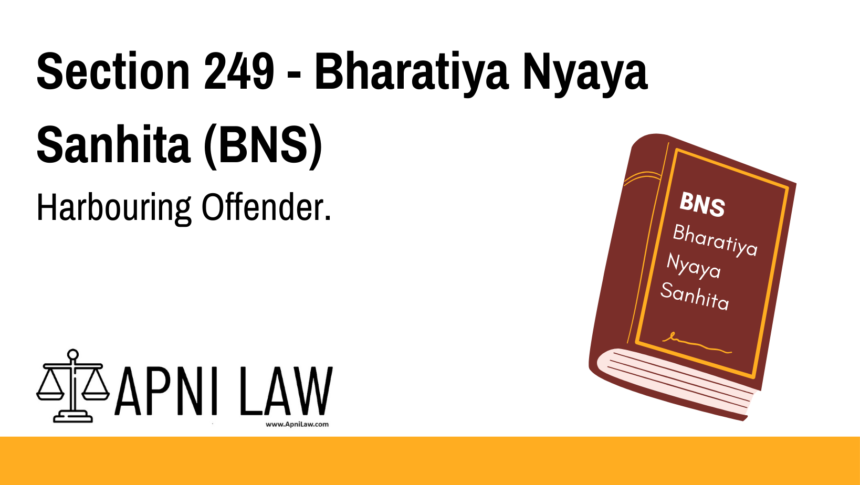Code: Section 249 BNS
Whenever an offence has been committed, whoever harbours or conceals a
person whom he knows or has reason to believe to be the offender, with the intention of
screening him from legal punishment shall,—
(a) if the offence is punishable with death, be punished with imprisonment of
either description for a term which may extend to five years, and shall also be liable
to fine;
(b) if the offence is punishable with imprisonment for life, or with imprisonment
which may extend to ten years, be punished with imprisonment of either description
for a term which may extend to three years, and shall also be liable to fine;
(c) if the offence is punishable with imprisonment which may extend to one
year, and not to ten years, be punished with imprisonment of the description provided
for the offence for a term which may extend to one-fourth part of the longest term of
imprisonment provided for the offence, or with fine, or with both.
Explanation.––“Offence” in this section includes any act committed at any place
out of India, which, if committed in India, would be punishable under any of the following
sections, namely, 103, 105, 307, sub-sections (2), (3) and (4) of section 309, sub-sections (2),
(3), (4) and (5) of section 310, 311, 312, clauses (f) and (g) of section 326, sub-sections (4),
(6), (7) and (8) of section 331, clauses (a) and (b) of section 332 and every such act shall,
for the purposes of this section, be deemed to be punishable as if the accused person had
been guilty of it in India.
Exception.—This section shall not extend to any case in which the harbour or
concealment is by the spouse of the offender.
Illustration.
A, knowing that B has committed dacoity, knowingly conceals B in order to screen
him from legal punishment. Here, as B is liable to imprisonment for life, A is liable to
imprisonment of either description for a term not exceeding three years, and is also liable
to fine.
Explanation of Section 249 BNS
What Does Section 249 BNS Cover?
Section 249 BNS punishes anyone who protects an offender from legal action by providing shelter, assistance, or hiding their identity.
Key Elements of Section 249 BNS
- Knowledge of Crime – The person must know that the offender has committed a crime.
- Harbouring or Concealing – The accused must assist, shelter, or help the offender avoid legal consequences.
- Two Levels of Punishment:
- If the original crime is serious (death/life imprisonment/10+ years) → Up to 7 years imprisonment + fine.
- If the original crime is less severe (less than 10 years) → Up to 3 years imprisonment + fine.
- Exception for Spouse – A person cannot be punished for harbouring their husband or wife.
Illustration
Example 1: Hiding a Murderer
A commits murder and seeks refuge at B’s house. B knows about the murder but still provides shelter and food to A to help him evade arrest. Since murder is punishable with death or life imprisonment, B can be jailed for up to 7 years under Section 249 BNS.
Example 2: Assisting a Theft Accused
X steals valuables from a shop. Y knows about the theft but helps X hide from the police. Theft is punishable by less than 10 years of imprisonment, so Y can be jailed for up to 3 years under this section.
Example 3: Harbouring a Spouse
P’s husband, Q, is accused of a crime. P helps Q escape arrest by hiding him at a relative’s house. However, since harbouring a spouse is an exception, P cannot be punished under Section 249 BNS.
Common Questions and Answers on Section 249 BNS
1. What is the purpose of Section 249 BNS?
- This section ensures that criminals do not escape justice by getting help from others.
2. What is the key ingredient of this offence?
- The person must knowingly help the offender avoid arrest, trial, or punishment.
3. What is the punishment under Section 249 BNS?
- For serious crimes (death/life imprisonment/10+ years) → Up to 7 years imprisonment + fine.
- For lesser crimes (under 10 years imprisonment) → Up to 3 years imprisonment + fine.
4. Who is exempted from punishment under Section 249 BNS?
- A spouse cannot be punished for harbouring their husband/wife.
5. Is Section 249 BNS a cognizable offence?
- Yes, the police can arrest the accused without a warrant.
Conclusion
Section 249 BNS ensures that offenders cannot evade justice by receiving illegal assistance. However, it also protects spouses from legal punishment in such cases.
For more legal insights, visit ApniLaw today! 🚀








